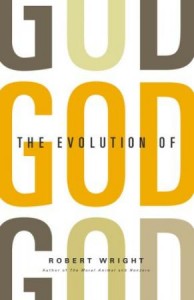 Robert Wright is an intellectually curious journalist and a fine writer whose previous books (The Moral Animal & Nonzero) I enjoyed. Wright’s new book explores the character of religion through history, and, marshalling scholarly research, shows how religious ideas developed in response to changing social and political circumstances. The explanations make no appeal to the supernatural. But Wright sees progress (however haphazard and intermittent) in
Robert Wright is an intellectually curious journalist and a fine writer whose previous books (The Moral Animal & Nonzero) I enjoyed. Wright’s new book explores the character of religion through history, and, marshalling scholarly research, shows how religious ideas developed in response to changing social and political circumstances. The explanations make no appeal to the supernatural. But Wright sees progress (however haphazard and intermittent) in
the moral dimension of religion through time, which leads him to speculate that this phenomenon actually points to the existence of something worthy of being named divine.
The bulk of the book is an interesting run new canadian meds through research findings from anthropology, archaeology and textual analysis on the topic of historical religious ideas and practices. The tour begins with a look at hunter-gatherer style animism and the role of gods and religion in tribal cultures, continues with an examination of the development of the various pantheons of gods in ancient civilizations, and
then tackles the Abrahamic traditions. In all cases there seems to be a plausible explanation of prevailing religious ideas and the character of God or gods changing in concert with the “facts on the ground”. As nations make war, their gods intone contempt for non-believers. As empires digest conquests, they co-opt the gods of their new subjects. More positively, as societies enter into non-zero sum relationships with a wider circle of neighbors, their gods become more universal and more supportive of a broader moral vision.
Wright also presents his own thoughts on what it all means. First off (repeating the theme from Nonzero), Wright argues that with the passage of time, humans have expanded their circle of moral consideration, and that this constitutes an arrow of moral progress through history. However, it seems hard to point to the evolution of our ideas regarding gods or God (more loving, less vengeful), and say that this adds anything to the story of moral progress. His analysis doesn’t provide evidence that religion drives moral progress – it seems to mainly reflect it.
Nevertheless, in the final section, Wright proposes that the existence of an historical arrow of moral progress might be evidence for an objective moral order which transcends nature. He argues that even if the traditional idea of a personal God seems highly implausible given naturalism, it might nonetheless point (however imperfectly) towards truth. His arguments for this position aren’t strong, however, consisting as they do of analogies and a repeated appeal that something special must be going; I don’t think many traditional materialist-atheists will be convinced.
This is unfortunate because I think his intuition is sound. I think that any naturalist worldview needs to be expansive enough
to account for first person experience and the meaning and values which arise from our engagement with the world. In any case, I admire Wright’s contribution in these books. And in particular I find his vision of moral progress to be inspiring. We can all hope that the forces of globalization in today’s world might promote peace, as we expand our circle of moral concern to finally cover the planet.